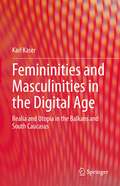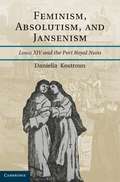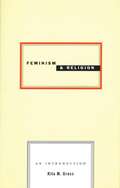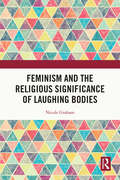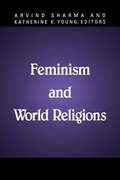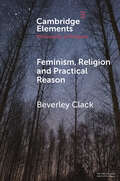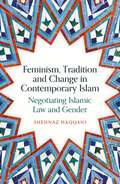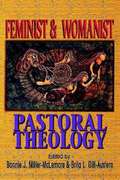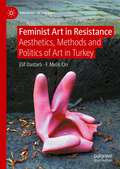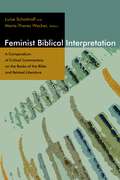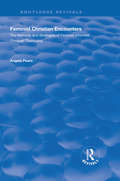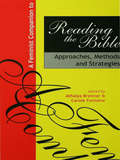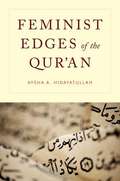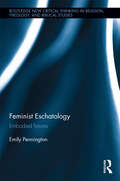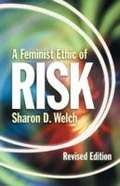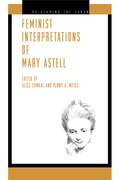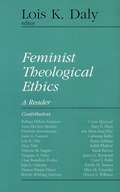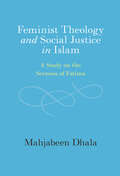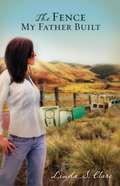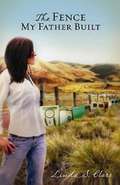- Table View
- List View
Feminine Mysteries in the Bible: The Soul Teachings of the Daughters of the Goddess
by Ruth RuscaAn exploration of the repressed, esoteric feminine mysteries in the Bible through the lives of four women, all archetypes of the sacred prostitute• Shows how these four archetypal women represent the four stages of development of soul consciousness• Reveals how the fear of the power of the sacred prostitute led to a rejection of female sexuality and a destructive dualistic notion of men and women• Explains how the dogma of the Immaculate Conception represents the repression of the divine feminine in ChristianityIn Feminine Mysteries in the Bible, Ruth Rusca unveils sacred mysteries of the feminine and the alchemical relationship of the male and female forces at the heart of the Judeo-Christian tradition. Drawing on over 30 years of research, she explores four archetypal women in the Bible: Tamar, the sacred prostitute; Rahab, the meretrix; Ruth, who redeems the soul; and Bathsheba, the daughter of the Goddess. These women--sacred prostitutes one and all--represent the indestructible feminine life force, the wisdom of the Goddess, and the transformative power of the soul, and they symbolize the four stages of the development of soul consciousness. Mary, mother of Jesus, is the quintessence of these four women, but Rusca shows that the dogma of the Immaculate Conception has repressed the significance of Mary and subverted the divine feminine in Christianity due to the church’s fear of women and their life-giving energy. These women pass an imperishable feminine life force from generation to generation, and understanding their lives creates a path to overcoming the destructive tendencies of dualistic “male-female” thinking--a duality that profanes feminine sexuality and mysteries rather than revering and celebrating them.
Femininities and Masculinities in the Digital Age: Realia and Utopia in the Balkans and South Caucasus
by Karl KaserThis book provides a fresh overview on the debate about the remarkable regression of gender equality in the Balkans and South Caucasus caused by the fall of socialism and by the revitalization of religion in Turkey. Contrary to the prevailing opinion of researchers who state continuous male domination, the book presents strong arguments for an alternative outlook. By contrasting the realia of gender relations with the utopia of new femininities and new masculinities driven by digital visual communication, the book provokingly concludes with the arrival of two utopias: the Marlboro Man – still authoritative but lonely – conquering and refusing family obligations; and with the emergence of a new femininity type – strong and beautiful. As such this book provides a great resource to anthropologists, demographers, sociologists, gender and media researchers and all those interested in feminist issues.
Feminism, Absolutism, and Jansenism
by Daniella KostrounFeminism, Absolutism, and Jansenism chronicles seventy years of Jansenist conflict and its complex intersection with power struggles between gallican bishops, Parlementaires, the Crown and the Pope. Daniella Kostroun focuses on the nuns of Port-Royal-des-Champs, whose community was disbanded by Louis XIV in 1709 as a threat to the state. Paradoxically, it was the nuns' adherence to their strict religious rule and the ideal of pious, innocent and politically disinterested behavior that allowed them to challenge absolutism effectively. Adopting methods from cultural studies, feminism and the Cambridge School of political thought, Kostroun examines how these nuns placed gender at the heart of the Jansenist challenge to the patriarchal and religious foundations of absolutism; they responded to royal persecution with a feminist defense of women's spiritual and rational equality and of the autonomy of the individual subject, thereby offering a bold challenge to the patriarchal and religious foundations of absolutism.
Feminism and Religion: An Introduction
by Rita M. GrossRita M. Gross offers an engaging survey of the changes feminism has wrought in religious ideas, beliefs, and practices around the world, as well as in the study and understanding of religion itself.
Feminism and Religion in the 21st Century: Technology, Dialogue, and Expanding Borders
by Gina Messina-Dysert Rosemary Radford RuetherThis anthology will explore the new directions of conversations occurring in relation to feminism and religion, as well as the technological modes being utilized to continue dialogue, expand borders, and create new frontiers in feminism. It is a cross generational project bringing together the voices of foremothers with those of the twenty-first century generation of feminist scholars to discuss the changing direction of feminism and religion, new methods of dialogue, and the benefits for society overall.
Feminism and the End of Traditional Religions
by Naomi R. GoldenbergGoldenberg asserts that Christianity and Judaism are patriarchal religions and it is impossible for women to achieve equality in these patriarchal religions. Through her examination of Jung and Freud, as well as modern religions such as Wicca, Goldenberg explores women's place in religion.
Feminism and the Religious Significance of Laughing Bodies
by Nicole GrahamThis book identifies the significance of the body through a feminist reconceptualisation of laughter as a means of insight.It positions itself within the emerging scholarship on religion and humour but distinguishes itself by moving away from the emphasis on humour and instead focuses on the place and role of laughter. Through a feminist reading of laughter, which is grounded in the philosophical and psychological works of William James, this book emphasises the importance of the body to offer an exploration of laughter as a means of insight. In doing so, it challenges the classificatory orders of knowledge by recognising and arguing for the value of the body in the creation of knowledge and understanding. To demonstrate the centrality of the body for insight laughter, and thus the creation of knowledge, this book engages with laughter within three thematic areas: religious experience, gendered experiences of laughter, and the ethics of laughter.This book will be of interest to students and researchers in religious studies, theology, gender studies, humour studies, philosophy, and the history of ideas.
Feminism and World Religions
by Arvind Sharma Katherine K. YoungFeminism has had, and continues to have, an impact on the world religions, because it has criticized them for perpetuating male hegemony over women, or "patriarchy." This book examines the interaction of feminism and world religions.
Feminism in Islam: Secular and Religious Convergences
by Margot BadranWhile many in the West regard feminism and Islam as a contradiction in terms, many Muslims in the East have perceived Western feminist forces in their midst as an assault upon their culture. In this career-spanning collection of influential essays, Margot Badran presents the feminisms that Muslim women have created, and examines Islamic and secular feminist ideologies side by side. Borne out of over two decades of work, this important volume combines essays from a variety of sources, ranging from those which originated as conference papers to those published in the popular press. Also including original material written specifically for this book, Feminism and Islam provides a unique and wide-ranging contribution to the field of Islam and gender studies. Margot Badran is a Senior Fellow at the Center for Muslim Christian Understanding, Georgetown University, US. She is currently Edith Kreeger Wolf Distinguished Visiting Professor in the Department of Religion, Northwestern University, US. She is the author of Feminists, Islam and Nation: Gender and the Making of Modern Egypt
Feminism, Religion and Practical Reason (Elements in the Philosophy of Religion)
by Beverley ClackPamela Sue Anderson's A Feminist Philosophy of Religion (1998) and Grace Jantzen's Becoming Divine: Towards a Feminist Philosophy of Religion (1998) set the tone for subsequent feminist philosophies of religion. This Element builds upon the legacy of their investigations, revisiting and extending aspects of their work for a contemporary context struggling with the impact of 'post-truth' forms of politics. Reclaiming the power of collective action felt in religious community and the importance of the struggle for truth enables a changed perspective on the world, itself necessary to realise the feminist desire for more flourishing forms of life and relationship crucial to feminist philosophy of religion.
Feminism, Tradition and Change in Contemporary Islam: Negotiating Islamic Law and Gender
by Shehnaz HaqqaniThe Islamic tradition has always been flexible, changing over time and constantly adapting to the different societies Muslims find themselves in. Few Muslims today would abide by the fatwa against the printing press under the Ottomans. Moreover, although Islamic law legislates for slavery and child marriage, only a vanishing minority of Muslims consider these practices acceptable today – and some will even argue that Islam never permitted them. Yet some issues, like the prohibition on female-led prayer and female interfaith marriage seem curiously impervious to change. Why is that? Through a mixture of interviews with ordinary Muslims in Texas and critical analysis of contemporary and historical scholarship, Shehnaz Haqqani demonstrates the gendered dimensions of change and negotiation in Islamic tradition. She argues that a reliance on a mostly-male scholarly consensus means that the &‘tradition&’ preserves male privilege at the expense of justice for Muslim women.
Feminist and Womanist Pastoral Theology
by Bonnie J. Miller-McLemore Brita L. Gill-AusternIn the last decade, the focus of pastoral theology has shifted dramatically from care defined as counseling to care understood within a wider social, political, and religious context. Feminist and womanist theory as well as feminist and womanist faith convictions have played a key role in this development. According to the authors, feminists and womanists in pastoral theology have begun to reconstruct the definitions, parameters, and commitments of pastoral care and counseling. These changes have critical implications for care within congregations and for the understanding of theology in seminaries and divinity schools. Yet these developments in the theory and practice of pastoral theology and their broader ramifications have not been carefully analyzed or even acknowledged by pastoral theologian, minister, and religion scholar alike. This is due to a failure to articulate clear understandings of the field, the gap between congregational ministry and higher education in religion, and conflicts in theological education in general over the place of practice and theory, experience, spirituality, and practical theology. To redress these problems, this collection of essays has a threefold aim. First, the book identifies the many changes occurring in definitions of pastoral theology, care, and counseling. Second, the volume defines and develops new methods and approaches. Third, the authors attend to the implications of these changes for congregational care and theological education. Roughly speaking, the order of the chapters in this volume follows this threefold agenda, moving from an exploration of the changes in pastoral theology to its reconstruction to some of the implications of recent innovations
Feminist Art in Resistance: Aesthetics, Methods and Politics of Art in Turkey (Sociology of the Arts)
by F. Melis Cin Elif DastarlıThis book provides a thorough interdisciplinary analysis of the ways in which artists have engaged with political and feminist grassroots movements to characterise a new direction in the production of feminist art. The authors conceptualise feminist art in Turkey through the lens of feminist philosophy by offering a historical analysis of how feminism and art interacts, analysing emerging feminist artwork and exploring the ways in which feminist art as a form opens alternative political spaces of social collectivities and dissent, to address epistemic injustices. The book also explores how the global art and feminist movements (particularly in Europe) have manifested themselves in the art scenery of Turkey and argues that feminist art has transformed into a form of political and protest art which challenges the hegemonic masculinity dominating the aesthetic debates and political sphere. It is an invaluable reading for students and scholars of sociology of art, gender studies and political sociology.
Feminist Biblical Interpretation: A Compendium of Critical Commentary on the Books of the Bible and Related Literature
by Martin RumscheidtThe original German edition of Feminist Biblical Interpretation received high acclaim and widespread positive reviews in Europe. That groundbreaking reference tool for contextual biblical interpretation is here available in English for the first time. With contributions from more than sixty female scholars, this is the only one-volume feminist commentary on the entire Bible, including books that are relatively uncharted territory for feminist theology.
Feminist Christian Encounters: The Methods and Strategies of Feminist Informed Christian Theologies (Routledge Revivals)
by Angela PearsOriginally published in 2004. Feminist discourses have focused sustained and sometimes devastating critical attention on Christianity over the last fifty years. Today feminisms remain significant but often ambiguous forces in contemporary Christian theology. At a time in which questions about the success and viability of feminisms are increasingly posed, Feminist Christian Encounters makes a unique contribution to the ongoing investigation into the creative relationship between feminisms and Christianity. Angela Pears identifies some of the key theological and methodological mechanisms by which Christian feminist theologies are informed, sustained, and made possible by feminist values and critiques. Pears argues that certain strategies characterize the facilitation of this dialogue in contemporary Christian feminist theologies, enabling theologians to accept the values and critiques of feminisms whilst at the same time proclaim some level of commitment to Christianity. Engaging in a process of deconstruction of the methodologies of key Christian theological thinkers who have made use of feminisms in their theologies, this book reveals the mechanisms of feminist Christian encounter at work.
A Feminist Companion to Reading the Bible: Approaches, Methods and Strategies (Feminist Companion To The Bible Ser. #No. 11)
by Athalya Brenner Carole FontaineThis valuable resource both presents and demonstrates the numerous developments in feminist criticsm of the Bible and the enormous rage of influence that feminist criticism has come to have in biblical studies. The purpose of the book is to raise issues of method that are largely glossed over or merely implied in most non-feminist works on the Bible. The editors have included broadly theoretical essays on feminist methods and the various roles they may play in research and pedagogy, as well as non-feminist essays that have direct bearing on the methods or subject matter that feminists use, as well as reading that illustrate the variety of methodological strategies adopted by feminist scholars. Some 30 scholars, from North America and Europe, have contributed to this Companion.
Feminist Companion to Wisdom Literature
by Athalya BrennerThis book provides feminist approaches to Wisdom Literature from leading scholars of the Hebrew Bible and feminist hermeneutics.
Feminist Edges Of The Qur'an
by Aysha HidayatullahAysha A. Hidayatullah offers the first comprehensive examination of contemporary feminist Qur'anic interpretation, exploring its dynamic challenges to Islamic tradition and contemporary Muslim views of the Qur'an. She analyzes major feminist readings of the Qur'an beginning in the late twentieth century, synthesizing their common concepts and methods and revealing their vital part in the development of the nascent field of Qur'anic tafsir (exegesis).Hidayatullah contributes her own critical assessment of feminist ''impasses'' in the Qur'anic text and the field's appeals to the principles of equality and justice. She expands these observations into a radical critique of feminist approaches to the Qur'an, arguing that the feminist exegeticalendeavor has reached a point of irresolvable contradiction by making claims about the Qur'an that are not fully supported by the text. Hidayatullah outlines major challenges to the authority of feminist interpretations of the Qur'an and interrogates the feminist premises on which they have relied, questioning the viability of current strands of feminist Qur'anic interpretation and proposing a major revision of its exegetical positions.An innovative work of Muslim feminist theology, this volume offers an essential contribution to conversations about feminist tafsir and asking bold questions at the ''edge'' of Qur'anic interpretation.
Feminist Eschatology: Embodied Futures (Routledge New Critical Thinking in Religion, Theology and Biblical Studies)
by Emily PenningtonMany feminist theologians have made timely and valuable contributions to rethinking the eschaton by framing it as cyclical and by embracing endings as they are experienced by present relational, fluid, and sensuous bodies. However, any sense of eschatological finality or ultimacy has either been rejected or ignored. Feminist Eschatology seeks to think differently about Christian eschatology in light of contributions from feminist theologians, noting the numerous and varied critiques they have made of traditional models. These critiques are identified as being directed towards three key claims: eschatology is understood to be actuated by a domineering God, populated by masculinised beings, and disassociated from present lives. Using a form of strategic feminism, wherein traits associated with female bodies, and some women's experiences of their bodies, are used to rethink the end-time of the eschaton, this book contributes to the meaning and significance of both bodies and eschatology.
A Feminist Ethic of Risk
by Sharon WelchA Feminist Ethic of Risk proposes a new model for ethics and new life orientation for social justice. It directly addresses American and European "middle-class despair" over issues and challenges seemingly too large to tackle, such as environmental destruction or racism. Her ethic uproots classical assumptions and opens up the possibility of a strong religious vision or "theology of resistance and hope." This new edition includes a new chapter that situates the feminist ethic of risk in relation to other styles and options in religious ethics today.
Feminist Interpretations of Mary Astell (Re-Reading the Canon)
by Penny A. Weiss Alice SowaalOften referred to as a proto-feminist, early modern English philosopher and rhetorician Mary Astell was a pious supporter of monarchy who wrote about gender equality at a time when society tightly constrained female agency. This diverse collection of essays situates her ideas in feminist, historical, and philosophical contexts. Focusing on Astell’s work and thought, this book explores the degree to which she can be considered a “feminist” in light of her adherence to Cartesianism, Christian theology, and Tory politics. The contributors explore the philosophical underpinnings of Astell’s outspoken advocacy for the autonomy and education of women; examine the intricacies underlying her theories of power, community, and female resistance to unlawful authority; and reveal the similarities between her own philosophy of gender and sexual politics and feminist theorizing today.A broad-ranging look at one of the most important female writers of the seventeenth and eighteenth centuries, this volume will be especially valuable to students and scholars of feminist history and philosophy and the early modern era.Aside from the editors, the contributors are Kathleen A. Ahearn, Jacqueline Broad, Karen Detlefsen, Susan Paterson Glover, Marcy P. Lascano, Elisabeth Hedrick Moser, Christine Mason Sutherland, and Nancy Tuana.
Feminist Theological Ethics: A Reader
by Lois K. DalyA variety of issues, from reproduction to war, are discussed from an array of perspectives, including womanist and ecofeminist. The book is ideal for feminist theology and feminist ethics classes, and is sure to become an instant classic.
Feminist Theology and Social Justice in Islam: A Study on the Sermon of Fatima
by null Mahjabeen DhalaFatima, the daughter of Mohammed, is best known for her protest sermon, an important document from the early Islamic era. Mahjabeen Dhala here offers an in-depth analysis of this captivating narrative, which lies at the intersection of theology and women's studies. A fresh and deep study of Fatima's sermon from feminist and social justice perspectives, she reclaims the voice of a seventh-century Muslim woman theologian and female inheritance rights activist from patriarchal, sectarian, and secular biases. Dhala unveils a rich tapestry of empowerment for women and political minorities within the Islamic tradition. She also uncovers the early origins of female agency and empowerment in Islam, shattering prevailing Western misconceptions and challenging the notion that Muslim women are passive bystanders. Additionally, Dhala's book contributes to our understanding of the role of women in Islamic theology and ethics, revealing their active engagement in promoting social justice and fostering transformative change.
The Fence My Far Built
by Linda S. ClareIn The Fence My Father Built when legally separated Muri Pond, a librarian, hauls her kids, teenage Nova and eleven year-old Truman, out to the tiny town of Murkee, Oregon, where her father, Joe Pond lived and died, she's confronted by a neighbor's harassment over water rights and Joe's legacy: a fence made from old oven doors. The fence and accompanying house trailer horrify rebellious Nova, who runs away to the drug-infested streets of Seattle. Muri searches for her daughter and for something to believe in, all the while trying to save her inheritance from the conniving neighbor who calls her dad Chief Joseph. Along with Joe's sister, Aunt Lutie, and the Red Rock Tabernacle Ladies, Muri must rediscover the faith her alcoholic dad never abandoned in order to reclaim her own spiritual path.
The Fence My Father Built
by Linda S. ClareIn The Fence My Father Built, when legally separated Muri Pond, a librarian, hauls her kids, teenage Nova and eleven year-old Truman, out to the tiny town of Murkee, Oregon, where her father, Joe Pond lived and died, she's confronted by a neighbor's harassment over water rights and Joe's legacy: a fence made from old oven doors. The fence and accompanying house trailer horrify rebellious Nova, who runs away to the drug-infested streets of Seattle. Muri searches for her daughter and for something to believe in, all the while trying to save her inheritance from the conniving neighbor who calls her dad Chief Joseph. Along with Joe's sister, Aunt Lutie, and the Red Rock Tabernacle Ladies, Muri must rediscover the faith her alcoholic dad never abandoned in order to reclaim her own spiritual path.

